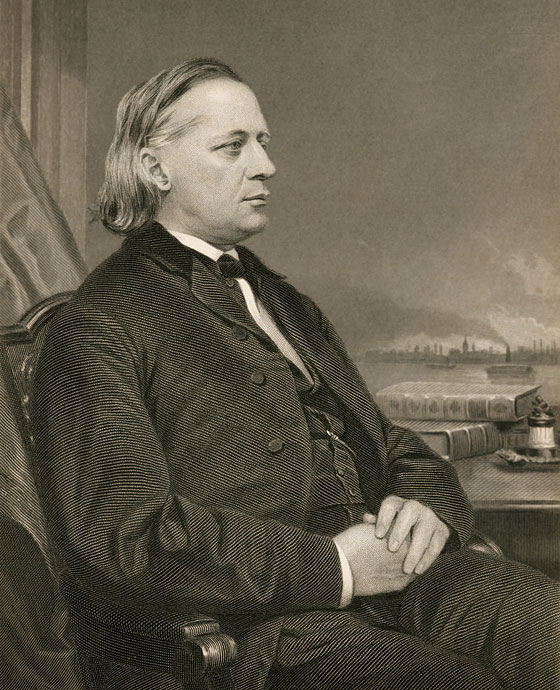
1875
Questions for Debby Applegate, author of The Most Famous Man in America, a Pulitzer Prize–winning biography of Henry Ward Beecher.
How did Henry Ward Beecher land in court?
Beecher was a famous and beloved Protestant preacher. He was head of the Plymouth Church in Brooklyn, and he had a falling out with a member of his congregation and his longtime friend, Theodore Tilton, who sued Beecher for “criminal conversation.” Essentially, he accused Beecher of having an affair with his wife, Elizabeth.
And this shocked the nation?
By some counts, there were more headlines devoted to the Beecher scandal than there were to the Civil War. It was a combination of who Beecher was and what he represented. He promoted several ideas, including that love should be the center of Christianity and that politics belongs in the pulpit. He advocated controversial causes, like the emancipation of slaves, and he created a lot of enemies. When you are controversial in a moral way, people are much more likely to point out your faults. But the problem was he couldn’t use his knowledge of human nature to keep himself out of trouble. I spent twenty years working on Beecher, and I am still shocked that powerful men think they won’t get caught. Truly, Henry Ward Beecher thought he could get away with it.
Even before the Tilton allegations surfaced, did Beecher have a reputation?
There were accusations all over. Everyone knew Beecher flirted too much. It was his “clerical weakness.” His delivery was so emotional and so genuine that people felt he was a personal conduit for God’s love: God loves Beecher, and Beecher loves me, so that must mean God also loves me. That creates a powerful temptation for a pastor. That attitude wasn’t great for his marriage; his wife was famously jealous. Many women in the Plymouth Church congregation would fall in love with him, and so he also made other marriages miserable, too.
So what was the scandal?
After the accusation was made public, there were plenty of “I told you so’s” and “You know that man.” But still, for a whole generation, the Beecher scandal was their version of an end of innocence. Every generation seems to have an “everything has changed” moment, a period of tremendous disillusionment. And here was this Oprah-like figure, who was open about his own failures, like a lovable old uncle, someone who always gave you a hug. Some scandals come from the glare of distance—a person looming so large above me that I will take pleasure to see him or her brought down. Beecher seemed like a better version of ourselves. He possessed a magical kind of charisma; people told him things that they never tell their spouses.
The trial ended in a hung jury. Did Beecher recover?
Not much changed for Beecher. He made more money in the last ten years of his life than ever before. Audiences went in droves to see him speak. His congregation gained members, and after trial, the church board of trustees voted to award him a $100,000 bonus. God bless America, we are the most curious people.